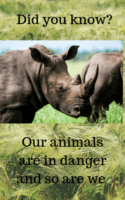Did you know that many animal populations in South Africa are declining rapidly. This is a problem because many of these animals are extremely important to the environment and the economy. Animals such as cheetahs, African penguins, and rhinos are all vulnerable or endangered. If they become extinct they won’t exist at all. Imagine one day telling your children that once upon a time there used to be animals called rhinos and cheetahs that lived in South Africa …
There are many reasons why these animal populations are declining. Cheetahs are killed by poachers and are losing their habitat to agricultural land. Farmers are sometimes forced to kill cheetahs because they attack, kill and eat their livestock. Penguins are dying because of things like pollution and trash in the ocean. Rhinos are killed by poachers for their horns, which are used for traditional medicine amongst other things.
Tourists come from all over the world to see these animals in our national parks and pay thousands of rands to do so. This puts a lot of money into South Africa’s economy. If these animals were to become extinct it would also upset the natural balance in nature. If cheetahs become extinct the animals they eat will not have any predators and could become over populated. Rhinos eat plants and if they become extinct it would change the plant habitats, which could threaten other species.
Another animal thats population is rapidly declining and that are vital to our survival as humans, are bees.
Bees are an extremely important insect. They produce honey and beeswax which can generate millions of rands per year. They also help pollinate plants which we need for our survival. Pollination occurs when a bee goes to one plant and some of the pollen sticks to its legs. They then fly to another plant and the pollen rubs off the bee’s legs onto the other plant – fertilizing it. Bees help to pollinate the same fruits and vegetables that we eat every day.
Bees are not only important in South Africa, but also in the entire world. According to the Food and Agriculture Organisation of the United Nations, two thirds of the world’s food crops rely on bees for fertilization. Without fertilization these food crops would die out and so would our food supply.
In recent years bees have been dying at an alarming rate across the entire globe. The main reason bees are dying is because of the use of pesticides on farms. Farmers are using pesticides in order to produce more crops, but it is coming at a cost. Pesticides affect the central nervous system of the bees which eventually kills the bees. Parasites which cause diseases are also another reason bees are dying. Just in 2015 an outbreak of disease killed 40% of bees in the Western Cape.
Bee keepers across South Africa have begun to take steps to combat this problem. They have begun to regulate bee hives more closely, which has helped them to regain control of the bee population.
Most people consider bees to be annoying pests that just go around stinging people, but they actually have a very important purpose in the world.
Albert Einstein once said, “If the bee disappeared off the surface of the globe, then man would only have four years of life left.”
So next time you see a bee and go to wack it out of the air, think about the consequences.
Luckily more and more people are becoming concerned about the future of bees and are doing all they can to protect them, and to spread the word about how important they are. Take this viral tweet for example:



